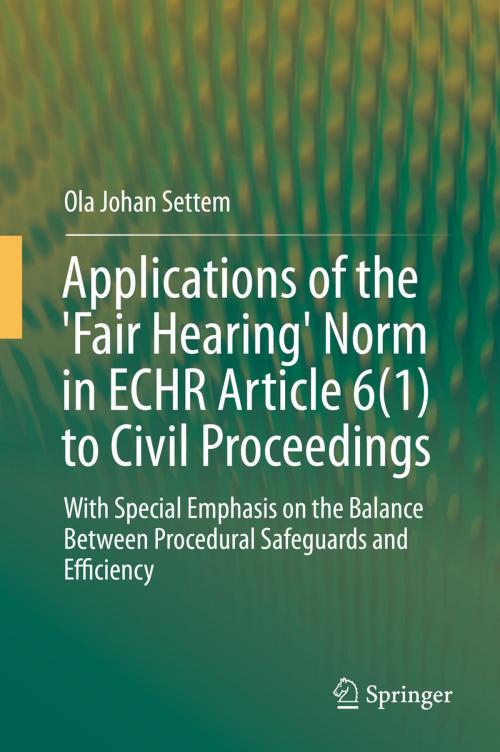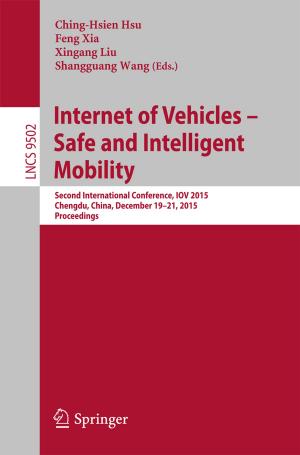Applications of the 'Fair Hearing' Norm in ECHR Article 6(1) to Civil Proceedings
With Special Emphasis on the Balance Between Procedural Safeguards and Efficiency
Nonfiction, Reference & Language, Law, International, Social & Cultural Studies, Political Science| Author: | Ola Johan Settem | ISBN: | 9783319248837 |
| Publisher: | Springer International Publishing | Publication: | December 15, 2015 |
| Imprint: | Springer | Language: | English |
| Author: | Ola Johan Settem |
| ISBN: | 9783319248837 |
| Publisher: | Springer International Publishing |
| Publication: | December 15, 2015 |
| Imprint: | Springer |
| Language: | English |
This book focuses on the most important implications of the "fair hearing" right for conducting civil proceedings. It provides a thorough and critical analysis of the case law of the European Court of Human Rights (the Strasbourg Court) regarding Article 6 of the European Convention on Human Rights. It puts forward a generally applicable framework for the analysis of the various procedural issues to which the "fair hearing" right may give rise, then applies that framework to discuss a selection of specific procedural issues.
The book investigates several important questions of general scope in the context of ECHR Article 6, such as: What is the relevance of case law regarding criminal proceedings when the "fair hearing" right is applied to civil proceedings? How does the Strasbourg Court actually proceed when evaluating whether specific court proceedings have been "fair"? What are the roles of fundamental concepts such as the "margin of appreciation" and proportionality in this regard?
In the subsequent discussion of specific procedural issues, the focus is on the balance that must be struck between procedural safeguards and the objectives of efficiency and economy. The book considers specific procedural issues such as: When must an oral hearing be held in order for civil proceedings to be "fair"? When will a refusal of specific evidence render civil proceedings unfair? When is a civil litigant entitled to le
gal aid?
As such, the book not only presents current case law; it also compares various strands of the case law regarding the "fair hearing" right, and argues that the Strasbourg Court's approach to various pertinent issues needs to become more consistent.
Offering an in-depth examination of the Strasbourg Court's case law regarding ECHR Article 6, this book should be consulted by anyone interested in fundamental fair trial rights.
This book focuses on the most important implications of the "fair hearing" right for conducting civil proceedings. It provides a thorough and critical analysis of the case law of the European Court of Human Rights (the Strasbourg Court) regarding Article 6 of the European Convention on Human Rights. It puts forward a generally applicable framework for the analysis of the various procedural issues to which the "fair hearing" right may give rise, then applies that framework to discuss a selection of specific procedural issues.
The book investigates several important questions of general scope in the context of ECHR Article 6, such as: What is the relevance of case law regarding criminal proceedings when the "fair hearing" right is applied to civil proceedings? How does the Strasbourg Court actually proceed when evaluating whether specific court proceedings have been "fair"? What are the roles of fundamental concepts such as the "margin of appreciation" and proportionality in this regard?
In the subsequent discussion of specific procedural issues, the focus is on the balance that must be struck between procedural safeguards and the objectives of efficiency and economy. The book considers specific procedural issues such as: When must an oral hearing be held in order for civil proceedings to be "fair"? When will a refusal of specific evidence render civil proceedings unfair? When is a civil litigant entitled to le
gal aid?
As such, the book not only presents current case law; it also compares various strands of the case law regarding the "fair hearing" right, and argues that the Strasbourg Court's approach to various pertinent issues needs to become more consistent.
Offering an in-depth examination of the Strasbourg Court's case law regarding ECHR Article 6, this book should be consulted by anyone interested in fundamental fair trial rights.















